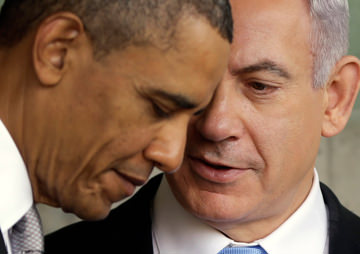Why America Continues to Back Israel While Some Other Countries Call for Boycotts
The U.S. government wasn't always Israel's strongest ally, but as political figures in countries such as Norway call for a boycott of Israeli goods to protest the Gaza operation, our politicians almost unanimously continue their unfailing support. President Obama listens to Israeli Prime Minister Benjamin Netanyahu on a visit to a Holocaust memorial in Jerusalem in 2013. (AP/Pablo Martinez Monsivais)
President Obama listens to Israeli Prime Minister Benjamin Netanyahu on a visit to a Holocaust memorial in Jerusalem in 2013. (AP/Pablo Martinez Monsivais)
The U.S. government wasn’t always Israel’s strongest ally, but as political figures in countries such as Norway call for a boycott of Israeli goods to protest the Gaza operation, our politicians almost unanimously continue their unfailing support. Flynt Leverett and Hillary Mann Leverett argue on Al-Jazeera that the strong ties between the two countries are rooted in U.S. hopes of “solidify[ing] US post-Cold War dominance over the strategically vital Middle East” and date back to the 1967 Arab-Israeli War.
Decades after this “special relationship” began, however, Washington’s “quest for hegemony” has failed in Iraq, Afghanistan and beyond, and the time has come to “shift” U.S. foreign policy “towards cultivating a stable balance of power in the Middle East and to promote greater reliance on international law and institutions as contributors to regional and global stability,” the Leveretts write.
And achieving this, the writers hold, would require a “fundamental revision of US posture towards Israel.” Something it seems, given President Obama’s consistent reiteration of support for Israel’s “right to defend itself,” American politicians seem unwilling and unprepared to do just yet.
Meanwhile, Wednesday morning top U.N. human rights official Navi Pillay “condemned Israel’s military actions in the Gaza Strip, saying that war crimes may have been committed,” according to the BBC.
Al-Jazeera:
The instrumental nature of the “special relationship” also shaped what seems, from outside, Washington’s chronically ineffectual stewardship of the so-called Middle East peace process – especially in seeking a two-state solution to the Israeli-Palestinian conflict. Notwithstanding rhetorical professions, neither Israel nor the US has ever wanted a two-state outcome.
Israel’s national security strategy has long rested on a military doctrine – which Israeli officials misleadingly label “deterrence” – requiring that Israel’s military be capable of using force first, disproportionately, and whenever and wherever in its neighbourhood Israeli politicians want. Pursuing a two-state solution seriously would ultimately curb this freedom of unilateral military initiative…Likewise, the US never intended the peace process to help Palestinians achieve real self-determination – for that would inevitably constrain Israel’s exercise of military supremacy over its neighbourhood, attenuating America’s own drive for Middle Eastern dominance. The process has instead been conducted to empower Israel, to subordinate Palestinians and other Arabs into an increasingly militarised US sphere of influence, and to leverage Arab states’ buy-in to this scenario.
These dynamics are vividly displayed in Israeli and US approaches to Gaza.
—Posted by Natasha Hakimi Zapata
Your support matters…Independent journalism is under threat and overshadowed by heavily funded mainstream media.
You can help level the playing field. Become a member.
Your tax-deductible contribution keeps us digging beneath the headlines to give you thought-provoking, investigative reporting and analysis that unearths what's really happening- without compromise.
Give today to support our courageous, independent journalists.






You need to be a supporter to comment.
There are currently no responses to this article.
Be the first to respond.